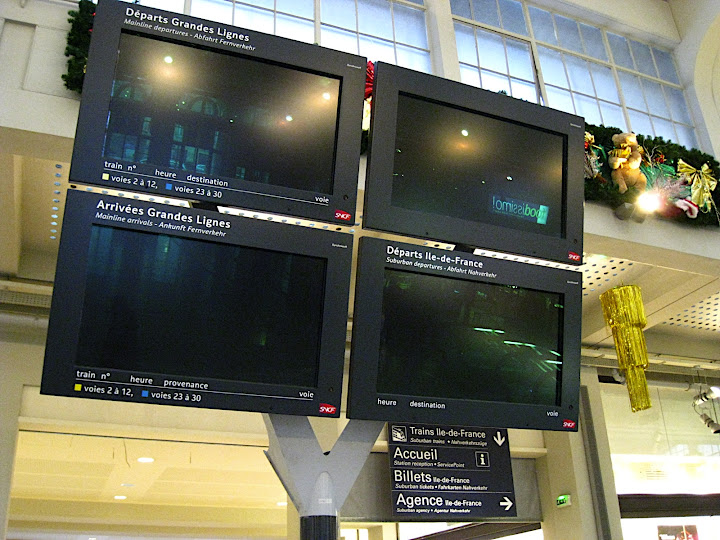My colleagues and I left Karlsruhe on a TGV train to Stuttgart then onto an ICE train to Munich around 10:30 yesterday. Throughout the trip, my colleagues were all wondering about the quality of the hotel that the secretary has booked us into. It is near the institute, which is on the outskirts of Munich, and a single room is only 53€ per night, which is really cheap for an expensive city.
 Here is my first sight of the hotel - not exactly love at first sight. I am not surprised by the Golden Arches next to a gas station, but I am surprised to find all three businesses occupying the same building. I'd imagine that there are some laws on a minimum distance between a gas station and dense living quarters.
Here is my first sight of the hotel - not exactly love at first sight. I am not surprised by the Golden Arches next to a gas station, but I am surprised to find all three businesses occupying the same building. I'd imagine that there are some laws on a minimum distance between a gas station and dense living quarters.The interior surprised me too. It has the most modern decor of all the hotels I have stayed in Europe. Not only that, there is free wireless internet (and not the usual 6€ per hour or 10-20€ per day rates at most hotels). As my parents would have said: "don't pre-judge anything or anyone based only on the outer appearance." After taking a mental note of the closest emergency exit from my room, I was a happy camper.
 After four talks at MPI, we headed to the group dinner at the renowned Hofbräuhaus. I visited this joint back in 2002 when I attended a conference here. I recall sitting in the big hall filled with benches on the ground floor, and reading a menu filled with schweine entrees and beer choices. This time the meeting organizers booked a dining room upstairs, and we all enjoyed a hearty Bavarian meal. I was the lone soul on our table of 12 who chose a green salad over Kartoffelsuppe (potato soup) as appetizer. Since I was in Bavaria, I followed the ritual of having a Schweinsbraten (roast pork) for entree. Many laughters and "regular" weißbier later, we dragged ourselves back to the hotel. BTW, a regular beer is half a litre in Munich.
After four talks at MPI, we headed to the group dinner at the renowned Hofbräuhaus. I visited this joint back in 2002 when I attended a conference here. I recall sitting in the big hall filled with benches on the ground floor, and reading a menu filled with schweine entrees and beer choices. This time the meeting organizers booked a dining room upstairs, and we all enjoyed a hearty Bavarian meal. I was the lone soul on our table of 12 who chose a green salad over Kartoffelsuppe (potato soup) as appetizer. Since I was in Bavaria, I followed the ritual of having a Schweinsbraten (roast pork) for entree. Many laughters and "regular" weißbier later, we dragged ourselves back to the hotel. BTW, a regular beer is half a litre in Munich.The talks on the second day were good. But the day passed by uneventfully until we arrived at the Munich main train station. The postdocs and students in the group rushed to the food fair and each ordered a leberkäsesemmel, which means "liver cheese bun" literally. What I have learned about German cuisine is that the descriptive names are usually inaccurate and sometimes deceptive. I was told that leberkäse has neither liver nor cheese (just like fleischkäse which has no cheese in it). But a 1-cm thick slice of mashed meat and whatever it is sandwiched in a semmel (bread roll) just did not look too appetizing to me (definitely not three hours after a hearty Bavarian lunch). I ignored my parents' advice on outer appearance this time, and passed on the opportunity to sample such Bavarian delicacy.
Three or so hours later, I was back in Karlsruhe.









